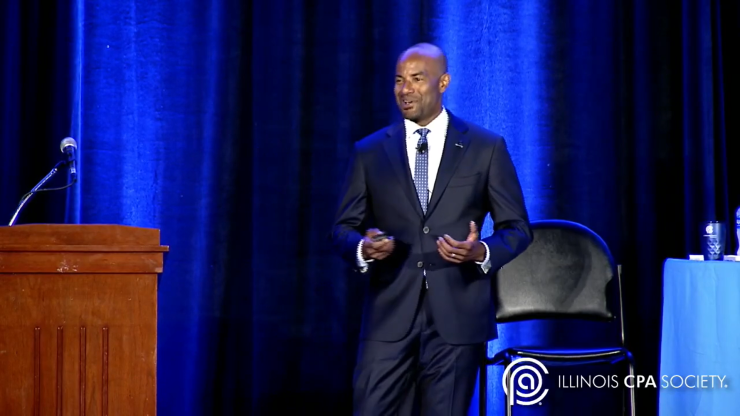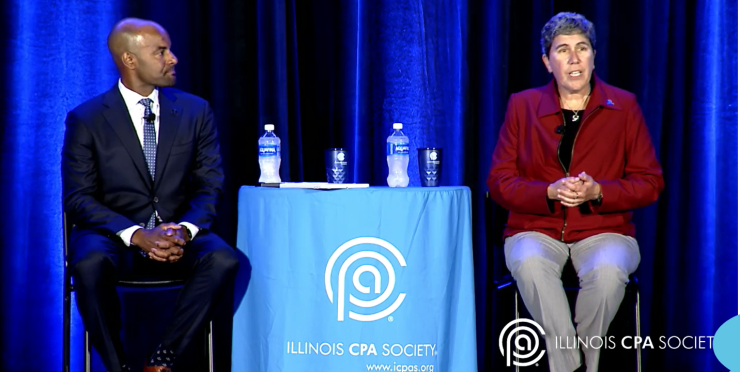Illinois CPA Society president and CEO Geoffrey Brown and chair Deborah Rood discussed some of the hot topics in the accounting profession during a recent ICPAS Summit.
“We can’t lose sight of the fact that there are a lot of hard trends that are impacting the profession, and they’re not going away anytime soon,” said Brown during a keynote address on Aug. 27. “We’re talking about our workforce issues, the impact of technology, an aging workforce, and we have to figure out how we’re going to confront and overcome them if we’re going to have that bright future that the profession deserves. We also have to take stock of the shifting landscape.”
One of the top challenges is the changing picture of the accounting profession. “We’re all confronted with an opportunity to transform the historic business model of public accounting and corporate finance so that we can become the employer of choice,” said Brown. “We can become the difference-maker in business, the difference-maker in capital markets, and really live into the future that we deserve. But we have to step back and think about how we’re going to lean into the opportunities that are on the horizon and really confront the challenges that are before us. I like to think that the only organizations and professionals that are going to get left behind in this dynamic are the ones that refuse to see the opportunity and to open themselves up to new skills and learning.”

Illinois CPA Society president and CEO Geoffrey Brown
He noted that the number of billion-dollar firms in the profession has doubled between 2020 and 2023, and much of their revenue is driven by consulting. U.S. CPA firms have actively acquired non-CPA lines of business. IT consulting and services led acquisition demand from 2019-2023, while business and management consulting services came in a close second.
“The thing that we really need to focus on is the impact of M&A and private equity investments,” said Brown. “Through the first six months of this year, deal flow has been pretty consistent with where it’s been the last couple of years, which points to a bright, thriving future for us. There’s a high volume, but it’s also going to mean that there’s new services that firms are trying to acquire. IT consulting services, and business and management consulting are the top two consulting services that they’re trying to add from a non-CPA service line. And that’s really exciting for us, because it means that there’s some things that are wrapping around that can really make you a difference maker in the lives of your clients.”
Attracting talent to the accounting profession continues to be a major issue. “Nobody should be surprised by the profession’s talent issues,” said Brown. “Luckily, there’s some change on the horizon, and we’re marshaling the resources to really focus on those, but finding and retaining staff, developing the next generation of leaders, compensation, rewards and utilization are all issues that are front and center, but they’re not insurmountable.”
Not as many young people are entering the accounting field. “We also know that we have an enrollment cliff,” said Brown. “High school graduation rates are set to peak around 2025, 2026. That means the college age population is going to shrink for the next 12 years, and there are fewer international students coming to the U.S. to matriculate.”
He also pointed to changes in parental preferences, with 46% of parents favoring something other than a four-year college degree for their children, according to a Gallup survey. “You’re probably thinking to yourself, well, the path to get to be a CPA includes a stop-off at a four-year college, so that means that there’s something else that we have to confront, accounting degrees,” said Brown. “The number of accounting graduates continues to decline, and then we have the number of job openings relative to the available workforce. These are all demographic challenges that are in front of us as we’re thinking about building the next generation of the workforce.”
He noted that only one in eight business majors graduates with a degree in accounting, and one of the main reasons they’re not pursuing accounting, cited by 70% of the respondents, is a lack of interest, followed by 61%, who cited a higher starting salary with other majors, and 61% who said the courses are too difficult and 60% who said they’re not good at math.
He pointed to the work of the National Pipeline Advisory Group, which includes representatives from various accounting organizations like the American Institute of CPAs and the National Association of State Boards of Accountancy, in building the accounting pipeline.
Brown also hopes to get more positive stories coming from CPAs communicated to young people. “We need more of you to be excited about talking about being a CPA, talking about the work that you do, talking about the difference that you make through your professional lives, the connections that you’ve created and what it’s meant for your family, things of that nature,” said Brown. “We don’t need anymore stories about that last busy season, how hard you work, the long hours, how many times you failed the exam. We need you to create stories that are more inviting and really help young people to understand that this is a right decision for them, that it can be a difference maker, that they do have an opportunity to do relevant work and to really make a difference. One of the things that we’re committed to as an organization is really helping to provide the resources for you all to do just that, whether it’s coaching or giving you materials to go into a high school. We just really need representatives of this profession to really tell young people what it’s like.”
He brought out ICPAS chairperson Deborah Rood, who is a risk control consulting director at CNA, which provides insurance coverage to CPAs. She discussed how she was inspired to get into the accounting field. “I was destined to be a CPA,” she said. “My dad was an accountant, and then the banker he worked with a lot of time went to him and said you’ve got to become a CPA. I’m not going to be able to use your financial statements anymore without you being a CPA. So at the age of maybe 30 or 35, he went back to school — and he had three kids at the time — and he went back and got his CPA.”

Illinois CPA Society president and CEO Geoffrey Brown and chairperson Deborah Rood at the ICPAS Summit
At first, she wanted to be a fighter pilot in the Air Force, but her eyesight wasn’t good enough, so she considered becoming a lawyer, but then found that she liked accounting better during a high school accounting class.
“Much of what we do isn’t math,” said Rood. “It really isn’t math anymore. The computer does all the math. You’ve got to look at things and say, does it make sense? But it’s really communication. It’s really a people profession where you have to be able to take those numbers and convert it to something that your clients understand and can act upon. And when we start talking about it, telling our story as ours, and talk about how we help people in those discussions and our clients appreciate everything, I think that can make a big difference.”
Source link : http://www.bing.com/news/apiclick.aspx?ref=FexRss&aid=&tid=66e3e8e03de443858690366606b9cc9d&url=https%3A%2F%2Fwww.accountingtoday.com%2Fnews%2Fillinois-cpas-meet-to-discuss-major-issues-in-profession&c=6576679367803262917&mkt=en-us
Author :
Publish date : 2024-09-11 09:06:00
Copyright for syndicated content belongs to the linked Source.
